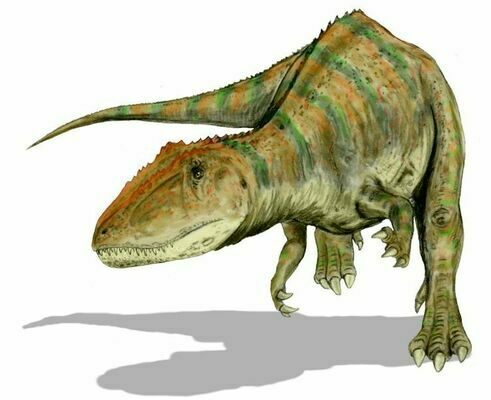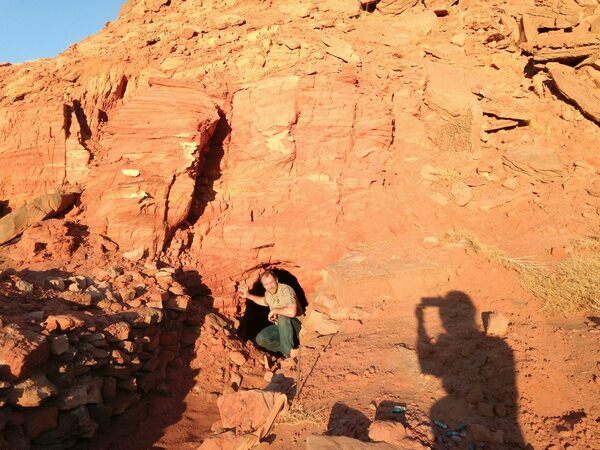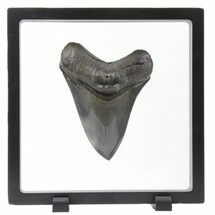Serrated, 2.14" Carcharodontosaurus Tooth - Real Dinosaur Tooth
This is a serrated, 2.14" long tooth of a sub-adult Carcharodontosaurus from the Late Cretaceous-aged Kem Kem Beds of Morocco. Carcharodontosaurus was a massive predatory dinosaur larger than Tyrannosaurus rex.
The tooth has multiple repaired cracks with areas of gap fill restoration.
The tooth has multiple repaired cracks with areas of gap fill restoration.
Comes with a floating frame display case.
About Carcharodontosaurus
Carcharodontosaurus comprised a genus of dinosaurs that dominated the land during the mid-Cretaceous Period, between 100-93 million years ago. This genus currently includes two gigantic species, which were among the largest known predatory dinosaurs. They were immense as the genera Tyrannosaurus and Giganotosaurus, but not as colossal as Spinosaurus.
Along with the spinosaurids, carcharodontosaurids were the largest predators in the early and middle Cretaceous throughout Gondwana, with species also present in North America (Acrocanthosaurus), and Asia (Shaochilong). Various scientists submit length estimates for C. saharicus, ranging between 12 and 13 m (39-43.5 ft) and weight estimates between 6 and 15 metric tons.
Carcharodontosaurids were a scourge of the land as giant, shark-toothed terrors in a world of monsters. Though spinosaurids would have been a formidable enemy, they may have occupied a semi-aquatic niche, which reduced competition. Both giant hunters also shared their world with menacing, 30-foot ancient crocodiles that had a taste for dinosaur.
Past the Turonian (93.9-89.8 mya), Carcharodontosaurus might have been replaced by the smaller abelisaurids in Gondwana and by tyrannosaurids in North America and Asia. The disappearance of carcharodontosaurids, spinosaurids, and other fauna in Gondwana and across the world suggests a global replacement event. Despite the event, fossils discovered in Brazil, which appear to be carcharodontosaurids, indicate some survivors of this group until the latest stage of the Cretaceous.
Carcharodontosaurus comprised a genus of dinosaurs that dominated the land during the mid-Cretaceous Period, between 100-93 million years ago. This genus currently includes two gigantic species, which were among the largest known predatory dinosaurs. They were immense as the genera Tyrannosaurus and Giganotosaurus, but not as colossal as Spinosaurus.
Along with the spinosaurids, carcharodontosaurids were the largest predators in the early and middle Cretaceous throughout Gondwana, with species also present in North America (Acrocanthosaurus), and Asia (Shaochilong). Various scientists submit length estimates for C. saharicus, ranging between 12 and 13 m (39-43.5 ft) and weight estimates between 6 and 15 metric tons.
Carcharodontosaurids were a scourge of the land as giant, shark-toothed terrors in a world of monsters. Though spinosaurids would have been a formidable enemy, they may have occupied a semi-aquatic niche, which reduced competition. Both giant hunters also shared their world with menacing, 30-foot ancient crocodiles that had a taste for dinosaur.
Past the Turonian (93.9-89.8 mya), Carcharodontosaurus might have been replaced by the smaller abelisaurids in Gondwana and by tyrannosaurids in North America and Asia. The disappearance of carcharodontosaurids, spinosaurids, and other fauna in Gondwana and across the world suggests a global replacement event. Despite the event, fossils discovered in Brazil, which appear to be carcharodontosaurids, indicate some survivors of this group until the latest stage of the Cretaceous.
The Kem Kem Group
The Kem Kem Group, also known as the Kem Kem Beds, is a significant geological formation located in southeastern Morocco, specifically in the region of the Anti-Atlas Mountains. This formation dates back to the late Cretaceous period, approximately 95 million years ago. The Kem Kem Beds are primarily composed of sandstone, siltstone, and claystone, interspersed with various sedimentary features that indicate a fluvial to deltaic environment.
The Kem Kem Group is renowned for its rich fossil deposits, which include a diverse array of prehistoric fauna. It has yielded a wide variety of dinosaur fossils, including theropods like Spinosaurus and Carcharodontosaurus, as well as large Sauropod dinosaurs such as Rebbachisaurus. Additionally, the beds are home to many other fossilized creatures, including crocodiles, pterosaurs, fish, and a range of invertebrates.
Paleontologists consider the Kem Kem Group an important site for studying late Cretaceous ecosystems and the evolution of vertebrate life. The fossils found in this region have provided valuable insights into the diversity and behavior of prehistoric species, making it a key location for both scientific research and fossil collecting. The striking landscapes of the Kem Kem Beds, with their colorful rock formations and dramatic geological features, also attract geologists and tourists interested in the natural history of the area.
A paper on this assemblage can be found at: Vertebrate assemblages from the early Late Cretaceous of southeastern Morocco: An overview
The Kem Kem Group, also known as the Kem Kem Beds, is a significant geological formation located in southeastern Morocco, specifically in the region of the Anti-Atlas Mountains. This formation dates back to the late Cretaceous period, approximately 95 million years ago. The Kem Kem Beds are primarily composed of sandstone, siltstone, and claystone, interspersed with various sedimentary features that indicate a fluvial to deltaic environment.
The Kem Kem Group is renowned for its rich fossil deposits, which include a diverse array of prehistoric fauna. It has yielded a wide variety of dinosaur fossils, including theropods like Spinosaurus and Carcharodontosaurus, as well as large Sauropod dinosaurs such as Rebbachisaurus. Additionally, the beds are home to many other fossilized creatures, including crocodiles, pterosaurs, fish, and a range of invertebrates.
Paleontologists consider the Kem Kem Group an important site for studying late Cretaceous ecosystems and the evolution of vertebrate life. The fossils found in this region have provided valuable insights into the diversity and behavior of prehistoric species, making it a key location for both scientific research and fossil collecting. The striking landscapes of the Kem Kem Beds, with their colorful rock formations and dramatic geological features, also attract geologists and tourists interested in the natural history of the area.
A paper on this assemblage can be found at: Vertebrate assemblages from the early Late Cretaceous of southeastern Morocco: An overview
$145
SPECIES
Carcharodontosaurus sp.
LOCATION
Taouz, Kem Kem Basin, Morocco
FORMATION
Kem Kem Beds
SIZE
2.14" long (straightline)
CATEGORY
SUB CATEGORY
ITEM
#311032
We guarantee the authenticity of all of our specimens.
 Reviews
Reviews














